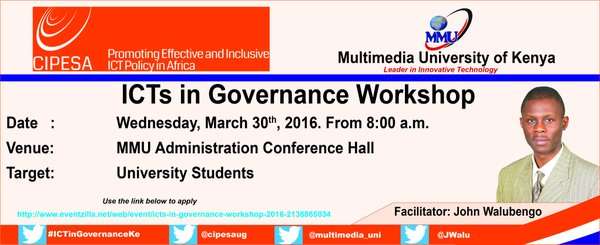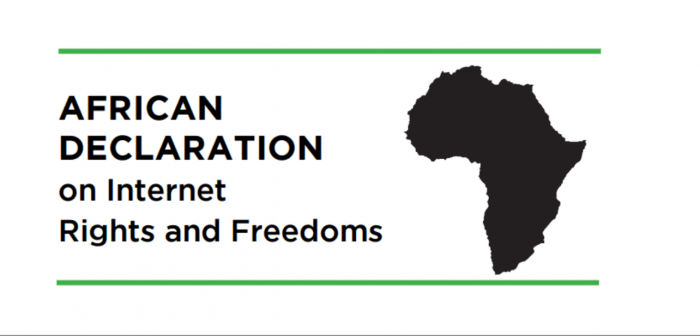Application | Interested in ICT? Interested in how it can be used to promote good governance in Kenya? Do you have your sights set on championing the path that ICT Governance in Kenya takes? Are you a University Student in Kenya? If you answered yes to all, then this workshop is for YOU!
The Collaboration on International ICT Policy for East And Southern Africa (CIPESA) is co-hosting and supporting a one day workshop that will explore these topics!
It will be held on Wednesday 30th March, 2016, at the Multimedia University and will be based upon a Kenyan Report on how ICTs are being used in service delivery, democratic participation, social accountability and in citizen engagement.
A total of 50 students will be selected to participate in the workshop.
The expected outcome of the workshop is to create the next generation of ICT Governance champions, while demonstrating how ICTs can be used positively for good governance.
Main Speaker: John Walubengo, MSc, BSc, CISA
Mr. Walubengo holds an MSc in Strategic Business IT (University of Portsmouth) and a BSc in Mathematics & Computing (KU). He has several industry certifications including the CCNA (Certified Cisco Network Associate) and the CISA (Certified Information Systems Auditor) certification. His area of specialisation is in ICT Governance, Policy & Strategy.
He has over 20 years experience in the ICT Training and Consulting. His work experience included working for the Strathmore University as the IT Course Director and as the founding Dean, Faculty of Computing at the Multimedia University. He is currently completing his PhD at the University of Nairobi and continues to provide Consultancy services to Government and other organisations. He writes a weekly column on topical ICT issues in one of the largest dailies in East and Central Africa.
If interested, please download and review the Kenya Report on ICT use in Governance) and subsequently apply to participate in this unique opportunity to be one of the next generation of ICT governance champions.
Join the ICT and governance discussion by understanding what is happening in the Kenyan context!
Follow @cipesaug @JWalu @multimedia_uni @kelvinkariuki89 on Twitter for updates
Tweet with #ICTinGovernanceKe
The African Declaration is Key to Reach a Common Understanding of Online Rights Policy
By APC |
“A fundamental challenge in need of urgent resolution in the digital age is how to protect human rights and freedoms on the Internet, and the African continent is no exception.” This is the introduction to the African Declaration on Internet Rights and Freedoms, an initiative joined by a diversity of organisations and individuals from the region to protect human rights in the context of the internet and digital technologies.
Analysis of Twitter Activity During the 2016 Presidential Debates in Uganda
By CIPESA Writer |
The 2015/2016 electioneering season in Uganda set a precedent in the use of social media as a means for politicians to reach out and engage with citizens. It was the first time in Uganda that a candidate announced they would run for President via YouTube and also saw candidate Yoweri Museveni (the incumbent) seek out a more tech-savvy media team to keep abreast with the widening channels of civic engagement.
While some of the candidates maintained personal Twitter accounts and actively engaged in the online conversations, others remained dormant, although they had Twitter accounts.
In partnership with Outbox we present the first of a three-part series into the key themes shaping the online conversation of Ugandans during the electioneering process.
The report explores the level of Twitter activity, interaction and conversational trends with specific focus on the #UgDebate16 hashtag during the 1st presidential debate held on January 15, 2016 and 2nd debate, which was held on February 13, 2016. During both debates, the hashtag trended locally and gained popularity as far as South Africa.
See the full report here: Analysis of Twitter Activity During the 2016 Presidential Debates in Uganda – Monitoring Uganda Elections Series 01 #UgDebate16
Joint Letter on Internet Shutdown in Uganda
By Access Now |
Mr. Zeid Ra’ad Al Hussein, Mr. David Kaye, Mr. Joseph Cannataci, Mr. Maina Kiai, Mr. Michel Forst, Ms. Faith Pansy Tlakula, and Ms. Reine Alapini-Gansou
cc: African Union
African Peer Review Mechanism (APRM) Secretariat
Common Market for Eastern and Southern Africa Secretariat
Domestic & International Election Observer Missions to the Republic of Uganda
East African Community Secretariat
International Conference on the Great Lakes Region Secretariat
New Partnership for Africa’s Development (NEPAD) Secretariat
Uganda Communications Commission
Uganda Electoral Commission
Uganda Ministry of Information and Communications Technology
23 February 2016
Re: Internet shutdown in Uganda and elections
Your Excellencies,
We are writing to urgently request your immediate action to condemn the internet shutdown in Uganda, and to prevent any systematic or targeted attacks on democracy and freedom of expression in other African nations during forthcoming elections in 2016. [1]
On February 18, Ugandan internet users detected an internet outage affecting Twitter, Facebook, and other communications platforms. [2] According to the Uganda Communications Commission (UCC), blocking was carried out on orders of the Electoral Commission, for security reasons. [3] The shutdown coincided with voting for the presidential election, and remained in place until the afternoon of Sunday, February 21. During this period, two presidential candidates were detained under house arrest. [4] The telco MTN Uganda confirmed the UCC directed it to block “Social Media and Mobile Money services due to a threat to Public Order & Safety.” [5] The blocking order also affected the telcos Airtel, Smile, Vodafone, and Africel. President Museveni admitted to journalists on February 18 that he had ordered the block because “steps must be taken for security to stop so many (social media users from) getting in trouble; it is temporary because some people use those pathways for telling lies.” [6]
Research shows that internet shutdowns and state violence go hand in hand. [7] Shutdowns disrupt the free flow of information and create a cover of darkness that allows state repression to occur without scrutiny. Worryingly, Uganda has joined an alarming global trend of government-mandated shutdowns during elections, a practice that many African Union member governments have recently adopted, including: Burundi, Congo-Brazzaville, Egypt, Sudan, the Central African Republic, Niger, Democratic Republic of Congo. [8], [9], [10], [11], [12], [13], [14]
Internet shutdowns — with governments ordering the suspension or throttling of entire networks, often during elections or public protests — must never be allowed to become the new normal. Justified for public safety purposes, shutdowns instead cut off access to vital information, e-financing, and emergency services, plunging whole societies into fear and destabilizing the internet’s power to support small business livelihoods and drive economic development.
Uganda’s shutdown occurred as more than 25 African Union member countries are preparing to conduct presidential, local, general or parliamentary elections. [15]
A growing body of jurisprudence declares shutdowns to violate international law. In 2015, various experts from the United Nations (UN) Organization for Security and Co-operation in Europe (OSCE), Organization of American States (OAS), and the African Commission on Human and Peoples’ Rights (ACHPR), issued an historic statement declaring that internet “kill switches” can never be justified under international human rights law, even in times of conflict. [16] General Comment 34 of the UN Human Rights Committee, the official interpreter of the International Covenant on Civil and Political Rights, emphasizes that restrictions on speech online must be strictly necessary and proportionate to achieve a legitimate purpose. Shutdowns disproportionately impact all users, and unnecessarily restrict access to information and emergency services communications during crucial moments.
The internet has enabled significant advances in health, education, and creativity, and it is now essential to fully realize human rights including participation in elections and access to information.
We humbly request that you use the vital positions of your good offices to:
- call upon the Ugandan government to provide redress to victims of the internet shutdown, and pledge not to issue similar orders in the future;
- call on African states to uphold their human rights obligations, and not to take disproportionate responses like issuing shutdown orders, especially during sensitive moments like elections;
- investigate shutdowns, in their various forms, in order to produce public reports that examine this alarming trend and its impact on human rights, and make recommendations to governments and companies on how to prevent future disruptions;
- encourage telecommunications and internet services providers to respect human rights and resist unlawful orders to violate user rights, including through public disclosures and transparency reports;
- encourage the African Commission on People’s and Human Rights, the United Nations Human Rights Council, and the UN General Assembly to resolve that Internet Shutdowns violate freedom of expression per se and without legal justification.
We are happy to assist you in any of these matters.
Sincerely,
Access Now
African Centre for Democracy and Human Rights Studies (ACDHRS)
Association for Progressive Communications (APC)
Article 19 East Africa
Chapter Four Uganda
CIPESA
CIVICUS
Committee to Protect Journalists
DefendDefenders (The East and Horn of Africa Human Rights Defenders Project)
Electronic Frontier Foundation (EFF)
Global Partners Digital
Hivos East Africa
ifreedom Uganda
Index on Censorship
Integrating Livelihoods thru Communication Information Technology (ILICIT Africa)
International Commission of Jurists Kenya
ISOC Uganda
KICTANet (Kenya ICT Action Network)
Media Rights Agenda
Paradigm Initiative Nigeria
The African Media Initiative (AMI)
Unwanted Witness
Web We Want Foundation
Women of Uganda Network (WOUGNET)
Zimbabwe Human Rights NGO Forum
Endnotes
[1] Uganda election: Facebook and Whatsapp blocked’ (BBC, 18 February 2016) <http://www.bbc.co.uk/news/world-africa-35601220> accessed 18 February 2016.
[2] Omar Mohammed, ‘Twitter and Facebook are blocked in Uganda as the country goes to the polls’ (Quartz Africa, 18 February 2016) <http://qz.com/619188/ugandan-citizens-say-twitter-and-facebook-have-been-blocked-as-the-election-gets-underway/> accessed 18 February 2016.
[3] Uganda blocks social media for ‘security reasons’, polls delayed over late voting material delivery (The Star, 18 February 2016) <http://www.the-star.co.ke/news/2016/02/18/uganda-blocks-social-media-for-security-reasons-polls-delayed-over_c1297431> accessed 18 February 2016.
[4] Brian Duggan, “Uganda shuts down social media; candidates arrested on election day” (CNN, 18 February 2016) <http://www.cnn.com/2016/02/18/world/uganda-election-social-media-shutdown/> accessed 22 February 2016.
[5] MTN Uganda <https://twitter.com/mtnug/status/700286134262353920> accessed 22 February 2016.
[6] Tabu Batugira, “Yoweri Museveni explains social media, mobile money shutdown” (Daily Nation, February 18, 2016) <http://www.nation.co.ke/news/Yoweri-Museveni-explains-social-media-mobile-money-shutdown/-/1056/3083032/-/8h5ykhz/-/index.html> accessed 22 February 2016.
[7] Sarah Myers West, ‘Research Shows Internet Shutdowns and State Violence Go Hand in Hand in Syria’ (Electronic Frontier Foundation, 1 July 2015)
<https://www.eff.org/deeplinks/2015/06/research-shows-internet-shutdowns-and-state-violence-go-hand-hand-syria> accessed 18 February 2016.
[8] ‘Access urges UN and African Union experts to take action on Burundi internet shutdown’ (Access Now 29 April 2015) <https://www.accessnow.org/access-urges-un-and-african-union-experts-to-take-action-on-burundi-interne/> accessed 18 February 2016.
[9] Deji Olukotun, ‘Government may have ordered internet shutdown in Congo-Brazzaville’ (Access Now 20 October 2015) <https://www.accessnow.org/government-may-have-ordered-internet-shutdown-in-congo-brazzaville/> accessed 18 February 2016.
[10] Deji Olukotun and Peter Micek, ‘Five years later: the internet shutdown that rocked Egypt’ (Access Now 21 January 2016) <https://www.accessnow.org/five-years-later-the-internet-shutdown-that-rocked-egypt/> accessed 18 February 2016.
[11] Peter Micek, ‘Update: Mass internet shutdown in Sudan follows days of protest’ (Access Now, 15 October 2013) <https://www.accessnow.org/mass-internet-shutdown-in-sudan-follows-days-of-protest/> accessed 18 February 2016.
[12] Peter Micek, ‘Access submits evidence to International Criminal Court on net shutdown in Central African Republic’(Access Now 17 February 2015) <https://www.accessnow.org/evidence-international-criminal-court-net-shutdown-in-central-african-repub/> accessed 18 February 2016.
[13] ‘Niger resorts to blocking in wake of violent protests against Charlie Hebdo cartoons.’ (Access Now Facebook page 26 January 2015) <https://www.facebook.com/accessnow/posts/10153030213288480> accessed 18 February 2016.
[14] Peter Micek, (Access Now 23 January 2015) ‘Violating International Law, DRC Orders Telcos to Cease Communications Services’ <https://www.accessnow.org/violating-international-law-drc-orders-telcos-vodafone-millicon-airtel/> accessed 18 February 2016.
[15] Confirmed elections in Africa in 2016 include: Central African Republic (14th February), Uganda (18th February), Comoros and Niger (21st February), Rwanda (22nd -27th February), Cape Verde (TBC February), Benin (6th-13th March), Niger, Tanzania and Congo (20th March), Rwanda (22nd March), Chad (10th April), Sudan (11th April), Djibouti (TBC April), Niger (9th May), Burkina Faso (22nd May), Senegal (TBC May), Sao Tome and Principe (TBC July), Zambia (11th July), Cape Verde (TBC August), Tunisia (30th October), Ghana (7th November), Democratic Republic of Congo (27th November), Equatorial Guinea (TBC November), Gambia (1st December), Sudan, and Cote d’Ivoire (TBC December). Other elections without confirmed dates are scheduled to occur in Sierra Leone, Mauritania, Libya, Mali, Guinea, Rwanda, Somalia, and Gabon.
[16] Peter Micek, (Access Now 4 May 2015) ‘Internet kill switches are a violation of human rights law, declare major UN and rights experts’ <https://www.accessnow.org/blog/2015/05/04/internet-kill-switches-are-a-violation-of-human-rights-law-declare-major-un> accessed 18 February 2016.
African Women's Safety Online in the Sustainable Development Goals Era
By Ashnah Kalemera |
On March 8, the world will commemorate International Women’s Day under the theme “Planet 50-50 by 2030: Step it up for Gender Equality”. According to the United Nations, the theme is a reflection of the Sustainable Development Goals related to gender equality and empowerment of all girls and women. However, affronts to women’s rights over the years have leaped from the offline into the online arena.
An estimated one third of all women worldwide experience physical or sexual violence in their lifetime – mostly by an intimate partner. According to a 2015 report, the proliferation of Information and Communication Technology (ICT) tools such as mobile phones and social media platforms are fuelling digitally enabled violence against women (VAW). In particular, the ICT tools which are easily accessible facilitate abuse through enabling anonymity of the perpetrators who could be located anywhere and without physical contact with the victim.
In Europe, one in 10 women have been victims of cyber harassment, including having received unwanted, offensive sexually explicit emails or SMS messages, or unwarranted inappropriate advances on social networking sites.
In Africa, the extent of online VAW remains unknown, mostly due to inhibitions including a culture of silence, and lower levels of access to the internet and related technologies. However, cases of revenge pornography, cyber stalking and cyber bullying are becoming rampant. In many instances, these cases go unreported and victims have limited legal recourse or resources to seek justice.
See for instance: Kenyan teenager commits suicide after a man she met through Facebook threatened to publish her nude photos; Online VAW victims in Uganda further subjected to threats of prosecution; and Blogging against an ex partner in the Democratic Republic of Congo.
During the 2015 Women’s Day Celebrations, there were calls for greater protections for women’s rights both online and offline. But many women remain uninformed of their rights online and are also unaware of the tools available to secure their online communications and information.
In commemoration of Safer Internet Day, popular social media service Facebook launched the first in a series of global roundtables to promote women’s safety online. Participants at the roundtable, which was held in Nairobi, Kenya, called for more research into the online VAW phenomenon in Africa and advocacy for laws which specifically address the vice. “Influencing policy on online violence against women requires evidence. Not only research but experiences,” noted one participant.
The availability of support mechanisms for victims was also emphasised with participants noting that offensive content takedowns “are not enough” and different kinds of responses were required depending on context. “First line responses need more capacity and awareness around technology. This should trickle down from intermediaries and service providers to law enforcement,” said another participant.
Meanwhile, consensus around definitions of the crimes including across diverse languages and colloquialisms must be agreed to inform advocacy and activism. It was recognised that online VAW is not “a new form” of violence against women, with participants noting that the online issues should be framed alongside issues of domestic violence and freedom of expression.
Furthermore, participants noted that women are not homogenous and efforts to address VAW both online and offline should be multi-lensed. In this regard, consideration should be made for class, ethnicity and religion, among other demographics. As noted at the 2015 Forum on Internet Freedom in East Africa, there are moral, cultural and legal distinctions of instances of violence against women in Africa, for instance genital mutilation.
The roundtable also called for more partnerships at local and international level between tech innovators and human rights organisations to develop tools and services that offer women protection against VAW.





